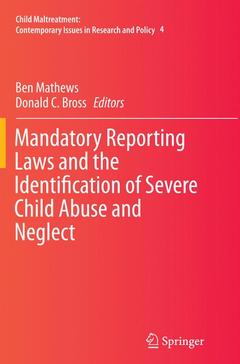Description
Mandatory Reporting Laws and the Identification of Severe Child Abuse and Neglect, 2015
Child Maltreatment Series, Vol. 4
Coordinators: Mathews Ben, Bross Donald C.
Language: English
Subjects for Mandatory Reporting Laws and the Identification of...:
Keywords
Child Abuse and neglect; Early intervention; Global issues and challenges; Law; policy and practice; Mandated Child Maltreatment reporting in the USA; Mandatory reporting laws; Mandatory reporting laws in public health; Outcomes of reporting vhild maltreatment; Sexual abuse by religious leaders
Publication date: 10-2016
Support: Print on demand
Publication date: 03-2015
564 p. · 15.5x23.5 cm · Hardback
Description
/li>Contents
/li>Biography
/li>Comment
/li>
This book provides the first comprehensive international coverage of key issues in mandatory reporting of child abuse and neglect. The book draws on a collection of the foremost scholars in the field, as well as clinicians and practice-based experts, to explore the nature, history, impact and justifiability of mandatory reporting laws, their optimal form, legal and conceptual issues, and practical issues and challenges for reporters, professional educators and governments. Key issues in non-Western nations are also explored briefly to assess the potential of socio-legal responses sex trafficking, forced child labour and child marriage. The book is of particular value to policy makers, educators and opinion leaders in government departments dealing with children, and to professionals and organisations who work with children. It is also intended to be a key authority for researchers and teachers in the fields of medicine, nursing, social work, education, law, psychology, health and allied health fields.
Introduction.- Outlining the nature of the book, and the background to the main concerns in the book – Donald C. Bross.- Part 1.- 1 Mandatory reporting laws: their origin, nature and development over time – Ben Mathews.- 2 Who is maltreated and how mandated reporting might help - Desmond K Runyan.- 3 Competing values and evidence: How do we evaluate mandated reporting and CPS response? - Brett Drake and Melissa Jonson-Reid.- 4 An inter-reporter analysis of mandated child maltreatment reporting in the USA - John E. Kesner and Bridget V. Dever.- 5 Privacy and legal duties to warn about unsafe behavior, conditions, or hazards: The example of child abuse and neglect reporting – Donald C. Bross.- 6 The historical background for mandatory reporting laws in public health – Edward Richards.- Part 2.- 7 A theoretical framework for designing and evaluating strategies to identify cases of serious child abuse and neglect – Ben Mathews.- 8 Ethics and the identification and response to child abuse and neglect - Jacqueline J. Glover, Ph.D. and Lisa M. Justis, LCSW, CTS.- 9 Medical perspectives: bioethics/ethics and the duties of medical professionals, and the nature, advantages and limits of public health approaches – Donald Woodhouse.- 10 Economic issues in the community response to child maltreatment – Leonie Segal.- Part 3.- 11 Neglect: Should there be mandatory reporting? – Edward Goldson.- 12 Mandatory reporting and the difficulties identifying and responding to risk of severe neglect: A response requiring a rethink – Bob Lone.- 13 The sins of the (Irish) fathers: Is mandatory reporting the best response? – Helen Buckley.- 14 Mandatory reporting of child sexual abuse by religious leaders – Patrick Parkinson.- Part 3.- 15 Practical issues and challenges for physicians reporting suspected child maltreatment – Emalee Flaherty.- 16 Training in reporting of child maltreatment: Where we are and where we need to go – Maureen C. Kenny.- 17 Anevidence-supported approach to reporting child maltreatment - Brad Donohue, Krisann Alvarez, Kimberly N. Schubert.- 18 Mandatory reporting of child abuse and neglect by health professionals - Debbie Scott and Jennifer Fraser.- 19 The social construction of disclosure: The case of child abuse in Israeli society - Zvi Eisikovits, Jonathan Davidov, Laura Sigad, Rachel Lev-Wiesel.- Part 4.- 20 What will happen to this child if I report? Outcomes of reporting child maltreatment - Theodore P. Cross, Betsy Goulet, Jesse J. Helton, Emily Lux, and Tamara Fuller.- 21 Rethinking the functioning of child protective services - John D. Fluke and Katherine Casillas.- 22 The role of mandatory reporting in preventative child welfare reforms: An uneasy fit? - Leah Bromfield.- 23 Mandatory reporting of child abuse and marginalised families - Heather Douglas and Tamara Walsh.- Part 5.- 24 The identification and reporting of severe violence against children: International standards and practices – Jaap E. Doek.- 25 Legislation concerning reporting of child sexual abuse and child trafficking in India: A closer look – Sibnath Deb.




